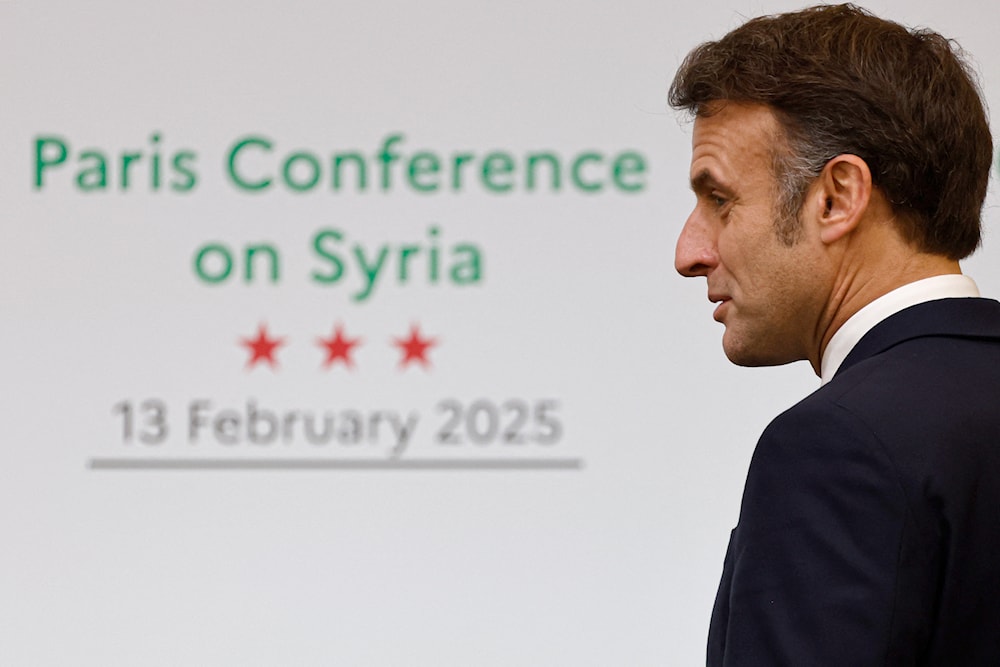Macron calls for integrating Western-backed SDF into Syrian forces
French Foreign Minister Jean-Noel Barrot said the European Union was moving quickly toward lifting sanctions on Syria.
-

France's President Emmanuel Macron looks on at the end of the International Conference on Syria at the Ministerial Conference Center, in Paris, on February 13, 2025 (AFP)
French President Emmanuel Macron called on Syria’s new leadership on Thursday to establish a government that is inclusive and respects all communities, speaking at a Paris conference on the country’s transition following the fall of Bashar al-Assad.
"The hope you carry on your shoulders is immense," Macron said at the international gathering, which was attended by Syria's Foreign Minister Asaad al-Shibani.
Al-Assad was ousted in December following a swift offensive led by the Hay'at Tahrir al-Sham (HTS) group. The new authorities, led by HTS leader Ahmad al-Sharaa, have been working to reassure the international community that they have broken from the past and are committed to protecting minority rights.
Seeking to rebuild the country’s economy after nearly 14 years of war, the new leadership has been lobbying Western nations to ease sanctions imposed on the previous regime.
"This capacity to respect all communities... is key. Because it will be the condition of stability" that will allow refugees to return to the country, Macron said, emphasizing that such stability is crucial for facilitating the return of refugees.
Macron also announced plans to host al-Sharaa in Paris "soon" but did not specify a date.
France ready to do more to fight terrorist groups in Syria: Macron
In a related context, the French President urged the new government in Damascus to join the fight against the Islamic State (IS) terrorist group, calling it "an absolute priority."
Macron said France is ready to do more to fight terrorist groups in Syria, stressing that the Western-backed Kurdish-led Syrian Democratic Forces should be integrated into Syrian national forces under the pretext that the group played a key role in the military campaign that ousted the terrorist group from their last scraps of Syrian territory. Despite this, IS cells continue to operate in Syria’s vast desert.
In 2014, IS terrorists seized vast areas of Syria and neighboring Iraq, declaring a so-called cross-border "caliphate".
Meanwhile, French Foreign Minister Jean-Noel Barrot said the European Union was moving quickly toward lifting sanctions on Syria.
"We are working with my European counterparts towards a rapid lifting of sectorial economic sanctions," Barrot stated, following an EU agreement last month to ease restrictions, beginning with key sectors such as energy.
Conference participants—including the United States, Germany, Britain, the European Union, and the United Nations—expressed their collective vision for "a free, sovereign, unified, and stable Syria," according to Barrot.
He also called for "a global ceasefire across all Syrian territory, including the north and northeast."
Following al-Assad’s overthrow, Turkish-backed factions launched attacks against Kurdish-held areas in northern Syria, seizing strategic territories.
Ensuring women’s representation
Western governments have expressed concerns about the direction of Syria’s new leadership, particularly regarding religious freedoms, women's rights, and the status of the Kurdish minority in the northeast.
On Wednesday, al-Shibani announced that a new government would be formed next month, replacing the interim cabinet, and pledged that it would be representative of Syria’s diverse population.
Ahead of the Paris conference, German Foreign Minister Annalena Baerbock stressed the importance of including "all actors" in Syria’s transition, emphasizing that it is "essential that women be represented."
Meanwhile, Britain unveiled plans to ease sanctions on Syria under a new proposal announced Thursday.
Foreign Office Minister Stephen Doughty said the plan would "include the relaxation of restrictions that apply to the energy, transport, and finance sectors," though the proposals are still subject to parliamentary debate.
Following the EU’s decision on January 27 to suspend sanctions on Syria for one year, al-Shibani welcomed the move, calling it a "positive step." This followed a similar move by the United States, which eased its own punitive measures by allowing fuel and electricity donations to Syria for six months.
Read more: UN envoy warns Syria’s new authorities against retaliatory violence

 4 Min Read
4 Min Read










